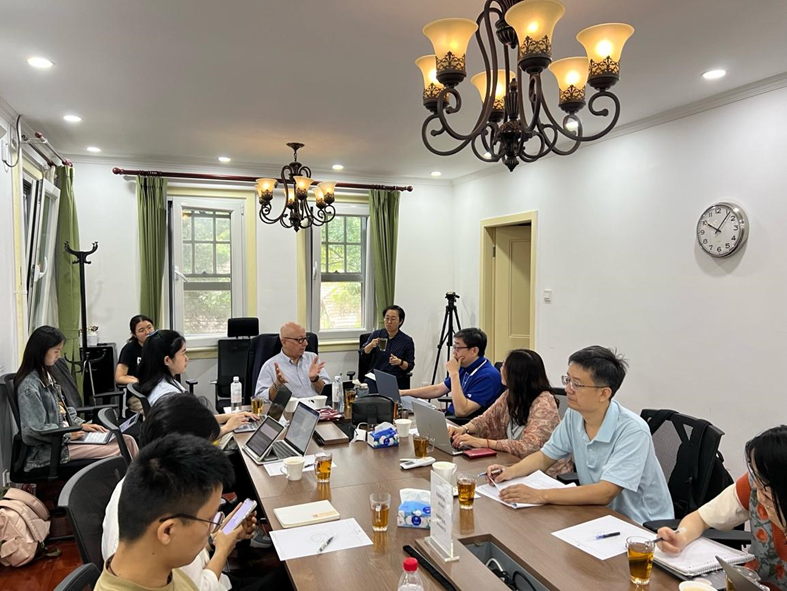
On September 16, 2025, Peking University’s Institute of Area Studies (PKUIAS) hosted the 57th “Adventus Amicorum” seminar. The event, titled “The Journey of a Private Diplomat,” featured a lecture by Michael Vatikiotis, senior advisor and former Asia regional director at the Centre for Humanitarian Dialogue (HD).
Zhang Yixun, a PhD candidate at PKUIAS, moderated the seminar. Panel discussants included Prof. Zhai Kun, deputy director of PKUIAS; Kong Tao, director of the Research Department at the Institute of Social Science Survey, PKU; Prof. Song Qingrun from School of Asian Studies and Research Fellow at the Centre for Southeast Asian Studies, Beijing Foreign Studies University; and Lü Xiaoyu, assistant professor from the School of International Studies, PKU.
Prof. Michael Vatikiotis’s academic journey and career path were shaped by a unique family background. His father, born into a Greek family in Palestine, pursued higher education in the US and became a university professor. Initially, Michael intended to follow in his father’s footsteps, enrolling at the School of Oriental and African Studies (SOAS) in London to focus on the Middle East. However, his interests shifted to Southeast Asian languages, history, and culture, a pivot that profoundly influenced his professional direction. While his early research centered on Indonesia, political restrictions on fieldwork led him to complete his doctoral thesis on ethnic diversity in northern Thailand. It was during this period that he also began his involvement in journalism.
Upon the closure of the Far Eastern Economic Review in 2004, where he had served as an editor and observed the evolution of traditional journalism, Prof. Vatikiotis was invited to join the Centre for Humanitarian Dialogue (HD). This organization, founded by former diplomats and UN officials, aimed to provide external support to the United Nations and conduct non-official conflict mediation. This invitation marked the start of Michael’s career as a “private diplomat.”
Prof. Vatikiotis highlighted that his background as a correspondent in Indonesia, Malaysia, and Thailand was crucial for his subsequent work in conflict mediation. His ability to speak local languages, combined with a thorough knowledge of historical contexts and cultural intricacies, allowed him to quickly establish trust and communicate effectively with diverse groups, including government officials, rebel factions, and local populations.
Prof. Vatikiotis highlighted his distinctive role as a “trusted outsider” in Southeast Asia. He observed that the region historically embraces external figures as impartial third parties, citing instances such as businesses employing foreign-descended accountants for financial transparency. Drawing from his mediation work in southern Thailand and Aceh, Indonesia, he emphasized that authentic neutrality necessitates profound empathy for local suffering and aspirations, rather than mere detachment.
He candidly addressed the difficulties inherent in regional specialization, stating, “The deeper your understanding of reality, the more inclined you become toward a certain pessimism.” For example, in situations like Myanmar and southern Thailand, seemingly viable solutions frequently face limitations due to underlying political and cultural frameworks. These include acute sensitivities concerning sovereignty, the intricate balance between the military, monarchy, and political factions, and deeply embedded factional interests.
Prof. Vatikiotis summarized his career as a journey from “area studies to field action.” He is currently working with the Indonesian Ministry of Foreign Affairs to develop mediation and peacebuilding strategies, emphasizing the “free and active” principle. He also advocates for strengthening the role of Global South countries in global governance discussions. He believes Southeast Asia’s strength lies in its cultural diversity and political adaptability. Given the current challenges to multilateralism, he suggests that regional powers like China and Indonesia should collaborate to find new frameworks for cooperation and security.
During an in-depth exchange, scholars and Prof. Vatikiotis discussed various issues, including factionalism in Southeast Asian politics, elite dynamics, and the media’s role. Participants concurred that Southeast Asian nations have displayed remarkable resilience in managing major-power competition and preserving regional stability, despite ongoing internal differences and conflicts. A consensus emerged on the necessity of transcending traditional security frameworks to tackle shared challenges—such as transnational crime, refugee crises, and developmental inequality—through more inclusive and innovative regional dialogue mechanisms.
Prof. Vatikiotis concluded that Southeast Asia’s survival hinges on its hybridity and flexibility. The region’s capacity to embrace external influences while preserving its internal cultural cohesion is crucial. To ensure future stability amid major-power rivalry and internal conflicts, Southeast Asia must develop more effective models of regional governance that prioritize diversity and foster more representative multilateral frameworks. In this context, China can contribute significantly by supporting regional development, participating in conflict prevention, and assisting in the fight against transnational crime, thereby collaborating with Southeast Asia to forge sustainable paths for security and cooperation.


